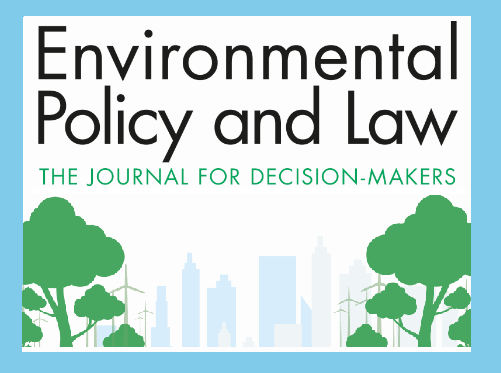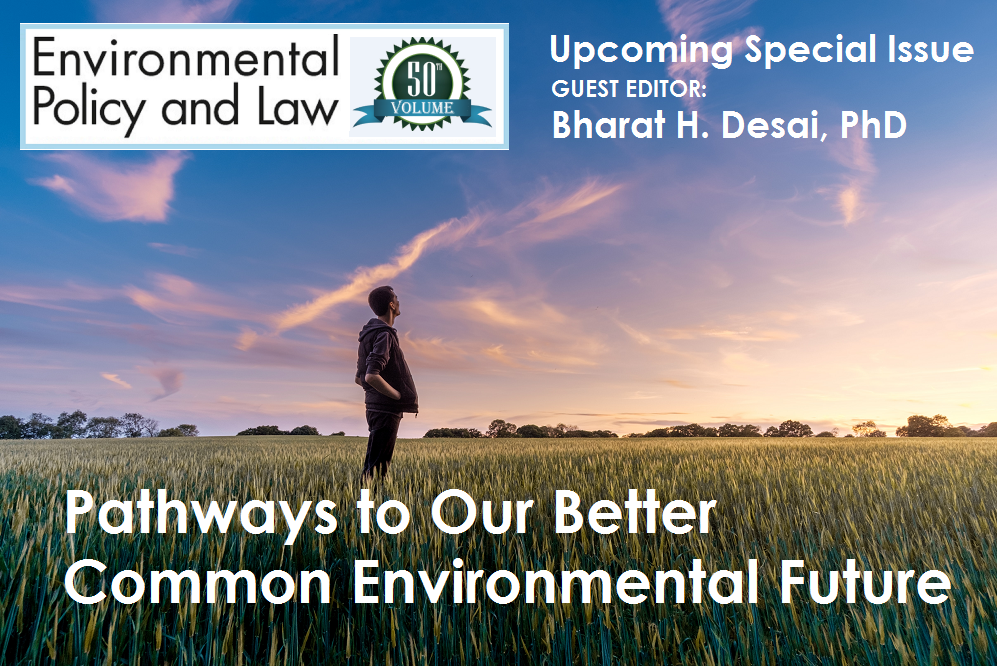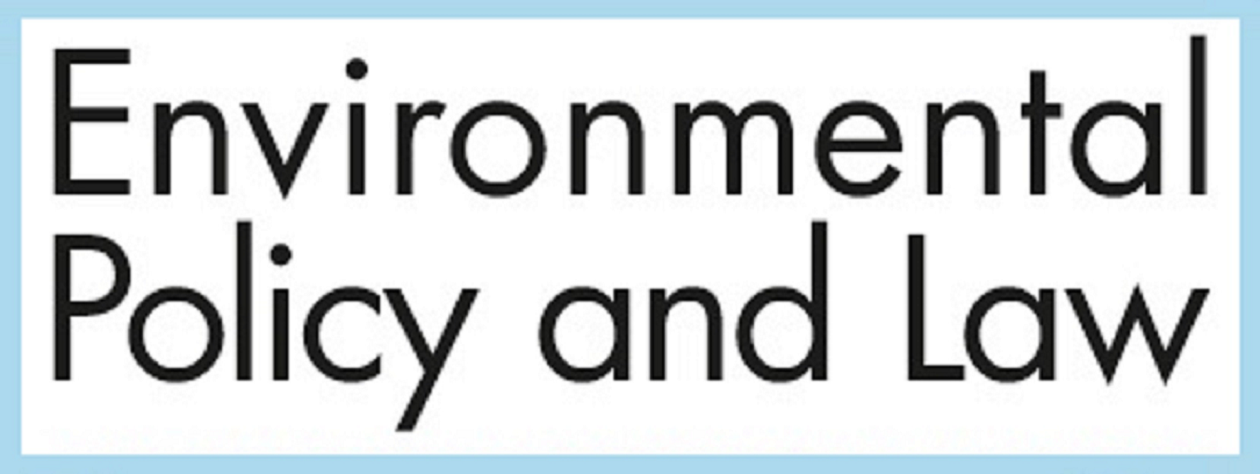
[Author: Carmel McNamara, IOS Press]
Amsterdam, NL – As we celebrate the publication of Volume 50 of Environmental Policy and Law (EPL) in 2020, we take a moment to reflect and then look to the future. For five decades, the journal has provided an exchange of information and experience on all legal, administrative, and policy matters relevant to the human and natural environment in its widest sense. Coinciding with the publication of its 50th volume, the journal will see a transformation. A celebratory special issue is also planned that will take us on a forward-looking environmental journey.
The journal, which will publish the first issue of Volume 50 in a matter of weeks, is undergoing a number of changes to mark this occasion. Perhaps, the most visually evident will be the new cover and branding (you can get a sneak peak of a portion of the new cover below). An updated publishing format has also been adopted and, behind-the-scenes, the metadata of all published articles are undergoing necessary adjustments to ensure that all our content is as accessible as possible and to further improve discoverability.

Expansion of content and expertise
As of 2020, the journal has a wider variety of article types available, covering a wide range of topics. Authors are invited to consider submitting research and review articles (which will undergo peer review), after reading the guidelines for manuscript preparation via the various links above. For a full list of the topics covered in the journal, see the Aims & Scope. Such manuscripts can then be submitted to the ediorial team via new online system (Editorial Manager). We also welcome other content, such as commentaries (perspectives and policy forums), short reports, etc. For guidelines on these types of articles, go here.
With the expansion of the type of content that is published in EPL, there is also a need to widen the pool of expertise. Tomme Young, EPL’s long-serving Managing Editor, comments on this in her upcoming Editorial: “Substantively, we are more fully embracing the ‘policy’ side of our mandate, beginning intensive efforts to seek out articles that are more ‘data-driven’ and to support the international goals of ‘science-based’ environmental action by demonstrating the facts underlying calls for action. Board expansion is intended to add new voices and perspectives, including a strong emphasis on scientific policy contributions, especially statistical bodies.”
In this respect, we are pleased to have welcomed a number of new Editorial Board members recently and we have also expanded input at a senior level. There are now six new Associate Editors that have been appointed so far (see here, along with comments from some of these individuals included below at the end of this article). We also welcome Bharat H. Desai (Jawaharlal Nehru University) to the senior team as Managing Editor. Prof. Desai will be working alongside Tomme and another new Managing Editor – Marten Stavenga (IOS Press) – to solicit content for regular and thematic/special issues. Kim Willems completes this team as the Journal Manager at IOS Press.

Celebratory special issue
Guest Editor: Bharat H. Desai, PhD
A key aspect of 2020 is the planning for our celebratory issue. Prof. Desai is the Guest Editor and an astounding series of articles have been commissioned on the theme: Pathways to Our Better Common Environmental Future. It will be guided by looking back at the trajectory hitherto followed – especially since the 50th anniversary of the United Nations Conference on the Human Environment held in Stockholm in June 1972 – and look ahead to find appropriate “pathways” to global regulation of the environment. As EPL celebrates its 50th volume, we are also on way to reaching the commemorations of the 50th anniversary since the Stockholm conference in 1972 (a number of events are planned by UNEP). So, this is perfect timing to probe the future trajectory for our better common environmental future.
The 20 articles in the issue will seek to ask various pertinent questions, for instance: What do we envision for the next 50 years? Do we need any major course correction in our global regulatory approach and the ethical underpinnings of the human–nature interaction? How do we leave a healthy environmental legacy for the next generation in the Anthropocene? Esteemed Editorial Board members Antonio H. Benjamin (High Court of Brazil), Edith Brown Weiss (Georgetown University), David Freestone (George Washington School of Law), Nicholas A. Robinson (Pace University Law School) and Christina Voigt (University of Oslo) will contribute to the special issue, along with environmental experts from Australia, Brazil, Germany, India, Ireland, the Netherlands, Norway, South Africa, Sweden, UK and USA.
In his Guest Editor’s role, Prof. Desai comments: “Outstanding scholars have been invited to contribute a thinking piece for this EPL special issue. A carefully calibrated topic will be taken up by each of the contributors to form part of a mosaic that could provide the best possible scholarly gaze into the future.”
New website for the wider community
We would be remiss if we did not mention our brand new EPL website in connection with the landmark celebrations, as its official launch will coincide with the publication of the first issue of Volume 50. This platform is an excellent complement to the growing digital portfolio of IOS Press and is just one avenue by which our authors, readers, journal audience, and partners can engage with one another. One of the key drivers for this site has been the need to create a home for content and features that do not readily fit into a standard journal format. Promoting EPL content will be the main focus, with there being many additional benefits that come from having a dedicated forum such as this one. We are able to highlight key content from the journal’s vast catalog (see here), ensure users can seamlessly access articles covering country-specific legislation (see here), and access news items that are featured (see here).
The EPL team will also be seeking collaborations with organizations across the globe to highlight environmental matters, and working closely with teams from other IOS Press publications to be sure of highlighting relevant topics that crossover between fields. New features and sections may arise as a result of these partnerships. Read more about the website, and how the community and audience can get involved, here.
The journal continues to be aimed at policy makers, civil servants, politicians, government officials, academics, and practitioners – and this website offers a platform for content in support of their policy decisions, developing policies, furthering research, and implementing programs. It will be a place to stay abreast of developments on legal, administrative and policy matters in the context of an increasing informatization and digitalization of the human and natural environment.
